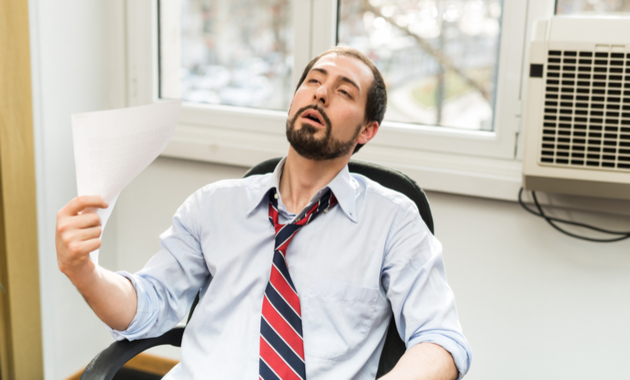
Akash was sitting in a fully air conditioned room but was sweating.
Sudha gets fully drenched in sweat when she reaches her office sitting in a cab.
Ram keeps the fan in his bedroom on full speed but he still wakes up in the middle of the night due to sweating.
We might have heard about these cases but never have paid any heed to it. Of course, sweating is quite common especially when you are out under the hot sun. But not if you are sweating too much even after sitting in an AC room or you tend to sweat profusely without any trigger or condition. This is because it could mean that you suffer from a condition known as hyperhidrosis or excessive sweating.
What is excessive sweating?
Sweating is the body’s natural response to certain conditions such as stress, anger, fear, physical activity or warm weather. But if you have hyperhidrosis, you tend to sweat more than usual, which could be due to an underlying health problem. Excessive sweating is categorized into focal or generalized sweating[1].
Focal sweating: Also known as primary hyperhidrosis, is idiopathic in nature, meaning there is no known reason for excessive sweating. It usually occurs suddenly and in otherwise healthy people. Often the onset is attributed to puberty[2]. It mostly causes sweating of the palms, armpits, soles, or face.
According to a 2005 study on focal hyperhidrosis[1], around 3% of the general population, mostly in the age group of 25-64 years, experience this condition. Moreover, this condition may be genetic in nature because 30% to 65% of patients with hyperhidrosis were known to have a positive family history[2].
Generalised sweating: If sweating is caused by an underlying medical condition or due to a side-effect of medicines, then it is known as generalized sweating or secondary hyperhidrosis. This type mostly involves the entire body, meaning you might sweat all over the body. Some of the common health problems that can lead to generalized sweating include endocrine disorders, neurological problems or infectious conditions.
Causes of excessive sweating
If you are sweating a lot of late or if you feel that your palms are sweaty most of the times, then it is time to consult a doctor and not ignore it because it could be a sign of an underlying health problem. Here are some of the common causes of excessive sweating and why you should not ignore the condition.
Anxiety or stress: One of the common causes of excessive sweating are anxiety and stress. It mainly causes sweaty palms and feet, which is mostly due to overactive sweat glands. The sweat glands in the hands and legs are connected to the sympathetic nervous system, which gets activated when a person is stressed or anxious.
Losing Work-Life Balance..?? Here’s The Right Medication.!!
Medications: Certain medications such as antidepressants and antiemetics also cause excessive sweating. Antidepressant-induced excessive sweating is predominantly seen in the face, scalp, neck, and chest and can be persistent for several months. These medications act on the nervous system and thus, cause hyperhidrosis.
Infections: Bacterial infections such as urinary tract infections or tuberculosis can lead to excessive sweating. In urinary tract infections, there is an accumulation of urine in the bladder, which increases bladder pressure. This can stimulate the sympathetic nerves, which causes a person to sweat profusely.
Neurological disorders: The neurons (brain cells) that control thermoregulation and production of sweat are situated in the spinal cord, brain stem, and hypothalamus. Hence, any changes in the nerve function or any damage or injury that impacts these regions can lead to excessive sweating. These conditions include spinal cord injury, Parkinson’s disease, and stroke.
Endocrine problems: Any imbalance in the hormones can activate the nerves which control thermoregulation and production of sweat. When these nerves overreact, it leads to excessive sweating. This is the reason why excessive sweating is one of the common symptoms of various hormonal problems such as:
-Diabetes
-Hyperthyroidism
-Menopause
-Acromegaly
-Hyper-pituitarism
The other common causes of hyperhidrosis include withdrawal of alcohol, heart disease, lung disease and malignancies like Hodgkin’s lymphoma.
**Consult India’s best doctors here**
Bottom line: Hyperhidrosis does have a significant impact on the quality of life and psychological health. Most patients are reluctant to visit a doctor because of the lack of awareness that hyperhidrosis can be treated and managed. Early detection and management of the condition through topical, systemic, surgical, and non-surgical treatments is possible.
(The article is reviewed by Dr. Shilpa Garcha, General Physician)
Recommended Reads:
6 Health Problems That Could Lead To Excessive Tiredness
What Causes Diabetic Neuropathy? Is it Reversible?
References:
1. Haider A, Solish N. Focal hyperhidrosis: diagnosis and management. CMAJ. 2005 Jan 4;172(1):69-75.
2. Schlereth T, Dieterich M, Birklein F. Hyperhidrosis—Causes and Treatment of Enhanced Sweating. Deutsches Ärzteblatt International. 2009;106(3):32-37.
3. Ismail D, Madhwapathi V, Ladoyanni E. Focal Hyperhidrosis Associated with Recurrent Urinary Tract Infections. Case Rep Dermatol Med. 2016;2016:3842984.
4. Stashak AB, Brewer JD. Management of hyperhidrosis. Clin Cosmet Investig Dermatol. 2014 Oct 29;7:285-99.
5. Brackenrich J, Fagg C. Hyperhidrosis. Treasure Island (FL): StatPearls Publishing; 2018 Jan.
6. Turchin I, Barankin B. Dermacase. Essential or primary hyperhidrosis. Can Fam Physician. 2005 Apr;51:503, 505-6.
7. Mago R, Thase ME, Rovner BW. Antidepressant-induced excessive sweating: clinical features and treatment with terazosin. Ann Clin Psychiatry. 2013 Aug;25(3):186-92.